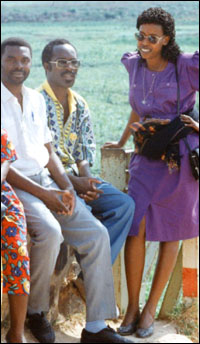|
 | Callixte Mbarushimana (center)
photo courtesy of Jon Swain |
U.N. Tribunal Finds in Favor of Former Genocide Suspect
By Michael Montgomery
A former U.N. employee accused of murdering dozens of civilians during the 1994 Rwanda genocide has been awarded thousands of dollars in compensation by the United Nations.
Callixte Mbarushimana filed a complaint saying he was unfairly dismissed by the U.N. after he was detained in 2001 on an international arrest warrant. A U.N. administrative panel agreed and awarded Mbarushimana 12 months' back pay, according to a copy of the July 23, 2004 decision obtained by American RadioWorks. The decision has not been released publicly.
The decision angered current and former United Nations officials who accused the U.N. of foot-dragging, mishandling evidence, and betraying victims of the genocide by finding in Mbarushimana's favor. They said the failure to prosecute Mbarushimana further undermines the U.N.'s credibility in confronting genocide.
Allegations that Mbarushimana participated in the mass killing of Tutsis circulated among U.N. staffers in the years following the Rwandan genocide. However, the U.N. did not investigate the charges and Mbarushimana continued to work for the U.N. until 2001. Rwandan officials issued an arrest warrant and Mbarushimana was briefly detained by a court in Kosovo in April 2001.
After Mbarushimana's release, U.N. war crimes investigators uncovered evidence linking him to at least six massacres of ethnic Tutsi civilians in Kigali, the Rwandan capital. American RadioWorks and PBS' FRONTLINE revealed details of the secret U.N. investigation in April 2004. The victims included Tutsis working for the U.N. who were hunted down and slaughtered by Hutu extremists. Mbarushimana is a Hutu.
Tony Greig, a New Zealand attorney who led the U.N. investigation, said he helped draft a genocide indictment against Mbarushimana, drawing on detailed accounts from 24 witnesses. It would have been the first time a U.N. worker was charged with international war crimes. However, the indictment was set aside and the investigation closed by Chief Prosecutor Carla Del Ponte. Del Ponte has refused to explain why Mbarushimana was not indicted.
Greig sharply criticized the U.N. Administrative Tribunal, saying the ruling ignored compelling evidence that Mbarushimana helped plan and carry out the genocide, including shooting victims himself.
"The decision is blinkered, factually incorrect, and as a result would not stand a review in any higher court of any jurisdiction," Greig said.
George Irving, Mbarushimana's U.S. attorney, said the Administrative Tribunal's ruling held that the U.N. violated due process in terminating his client's contract before a court ruled on the case.
"The principle is that until you have your day in court, there should not be any action taken that prejudices that decision," Irving said.
The Administrative Tribunal's decision is final and cannot be appealed by the U.N.. In 2002, a U.N. advisory board also recommended compensation for Mbarushimana, but those findings were non-binding. Irving said the award amounted to at least $30,000. Mbarushimana is a refugee in France.
Prior to the genocide, Mbarushimana was a computer technician for the U.N. Development Program (U.N.D.P.) in Kigali. When the Rwanda massacres erupted in April 1994, the U.N.D.P.'s international staff was evacuated and Tutsi employees went into hiding. Control of the U.N.D.P. compound fell to Mbarushimana.
Former colleagues alleged that Mbarushimana methodically organized the killings of scores of civilians, including as many as 30 Tutsis who worked for the U.N. Development Program.
Among Mbarushimana's alleged victims was Florence Ngirumpatse, a Tutsi who headed the U.N.D.P.'s personnel office in Kigali. In May 1994, Ngirumpatse was murdered with 12 other people, mainly schoolgirls, whom she was sheltering in her Kigali home. Survivors alleged Mbarushimana ordered the killings hours before Ngirumpatse and the children were to be evacuated.
"Wherever Callixte went, the next day people would be found dead," said Donita Mukabalisa, a former U.N.D.P. worker who is now a member of Rwanda's parliament.
Witnesses interviewed by Tony Greig, the former U.N. war crimes investigator, also alleged Mbarushimana provided U.N.D.P. resources to Hutu extremists, including cash, vehicles, and satellite phones used by the army high command.
The U.N.D.P. never investigated the killings of its Rwandan staff members or allegations that U.N. resources were used by leaders of the genocide.
Speaking through his lawyers, Mbarushimana has denied any involvement in the genocide and claimed to have saved the lives of colleagues while running the U.N.D.P. compound in Kigali.
Rwandan authorities say Mbarushimana is on a list of top genocide suspects living abroad. International law experts said Mbarushimana could be extradited for trial in Rwanda or his investigation could be re-opened by the U.N. war crimes tribunal. The latter option is being discussed at U.N. headquarters, but no formal request has been made, according to a U.N. source.
|

